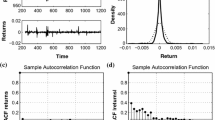Abstract
Since the subprime mortgage crisis in the United Sates, stock markets around the world have crashed, revealing their instability. To stem the decline in stock prices, short-selling regulations have been implemented in many markets. However, their effectiveness remains unclear. In this paper, we discuss the effectiveness of short-selling regulation using artificial markets. An artificial market is an agent-based model of financial markets. We constructed an artificial market that allows short-selling and an artificial market with short-selling regulation and have observed the stock prices in both of these markets. We found that the market in which short-selling was allowed was more stable than the market with short-selling regulation, and a bubble emerged in the regulated market. We evaluated the values of assets of agents who used three trading strategies, specifically, these agents were fundamentalists, chartists, and noise traders. The fundamentalists had the best performance among the three types of agents. Finally, we observe the price variations when the market price affects the theoretical price.
Access this chapter
Tax calculation will be finalised at checkout
Purchases are for personal use only
Preview
Unable to display preview. Download preview PDF.
Similar content being viewed by others
References
Arthur, W., Holland, J., LeBaron, B., Palmer, R., Tayler, P.: Asset pricing under endogenous expectations in an artificial stock market. In: The Economy as an Evolving Complex System II, pp. 15–44. Addison-Wesley, Reading (1997)
Arturo, B., Goetzmann, W.N., Zhu, N.: Efficiency and the bear: short sales and markets around the world, Yale ICF Working Paper No.02-45 (2004)
Chen, S.-H., Yeh, C.-H.: On the emergent properties of artificial stock markets: the efficient market hypothesis and the rational expectations hypothesis. Journal of Economic Behavior & Organization 49(2), 217–239 (2002)
Darley, V., Outkin, A.V.: A NASDAQ Market Simulation: Insights on a Major Market from the Science of Complex Adaptive Systems. World Scientific Pub. Co. Inc., Singapore (2007)
De Long, J.B., Shleifer, A., Summers, L.H., Waldmann, R.J.: Noise Trader Risk in Financial Markets. Journal of Political Economy 68(4), 703–738 (1990)
Hara, A., Nagao, T.: Construction and analysis of stock markets model using ADG; automatically defined groups. International Journal of Computational Intelligence and Application 2(4), 433–446 (2002)
Izumi, K., Toriumi, F., Matsui, H.: Evaluation of automated-trading programs using an artificial market. NeuroComputing (forthcoming)
Marsh, I.W., Niemer, N.: The impact of short sales restrictions, The London Investment Banking Association (2008)
Saffi, P.A.C., Sigurdsson, K.: Price efficiency and short-selling, AFA 2008 New Orleans Meeting Paper (2007)
Shiller, R.J.: Bubbles, Human Judgement, and Expert Opinion. Financial Analysts Journal 58, 18–26 (2001)
Soros, G.: The Alchemy of Finance. John Wiley & Sons. Inc., Chichester (2003)
Author information
Authors and Affiliations
Editor information
Editors and Affiliations
Rights and permissions
Copyright information
© 2010 Springer-Verlag Berlin Heidelberg
About this chapter
Cite this chapter
Yagi, I., Mizuta, T., Izumi, K. (2010). A Study on the Market Impact of Short-Selling Regulation Using Artificial Markets. In: Bai, Q., Fukuta, N. (eds) Advances in Practical Multi-Agent Systems. Studies in Computational Intelligence, vol 325. Springer, Berlin, Heidelberg. https://doi.org/10.1007/978-3-642-16098-1_14
Download citation
DOI: https://doi.org/10.1007/978-3-642-16098-1_14
Publisher Name: Springer, Berlin, Heidelberg
Print ISBN: 978-3-642-16097-4
Online ISBN: 978-3-642-16098-1
eBook Packages: EngineeringEngineering (R0)




